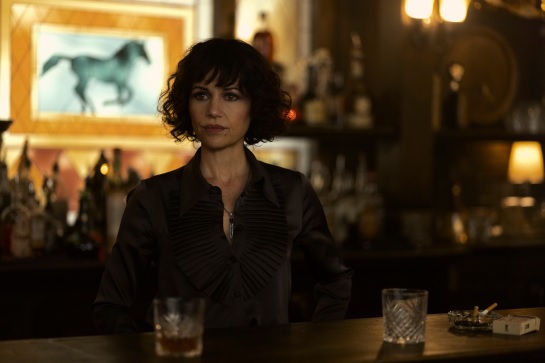 |
| Promo photo from Netflix’s The Fall of the House of Usher. (the pic is deliberately off-center) |
Near the climax of Netflix’s new adaptation of The Fall of the House of Usher, Madeline Usher (Mary McDonnell) delivers a monologue almost directly at the camera. Half-mad with grief, Madeline rants about the American condition, taking in almost everything synoptically: runaway consumerism, prescription drug abuse, wage stagnation, the Dodds decision. Then she asks her moon-eyed brother Roderick (Bruce Greenwood): are we culpable for this? Or do we just provide services which market forces demand?
The ”we” in this question is the rich. In Poe’s original short story, the Usher family’s wealth is poorly defined, the inheritance of a waning feudal aristocracy, and Madeline barely speaks. But in this adaptation, the Usher family’s wealth is very specific: they own Fortunato Pharmaceuticals, which aggressively markets an opioid drug to pain sufferers worldwide. This unsubtle dig at the Sackler family, owners of Purdue Pharma, which manufactures OxyContin, is just one anti-capitalist theme.
First, the overview. This is filmmaker Mike Flanagan’s fifth Netflix limited series, and the third adapting American horror properties, after The Haunting of Hill House and The Turn of the Screw (as The Haunting of Bly Manor). Like the previous two, this one samples liberally from the source author’s collected works, adapting the spirit of the text rather than the words. It’s beautifully paced, somber, and elegiac, but also gory enough for seasoned horror fans.
Flanagan’s previous adaptations have frequently commented on contemporary society. Midnight Mass has called out religious intolerance, for instance, and the ways that outward piety invite moral rot into communities. Usher, however, is distinct for not only having one-to-one criticisms of contemporary issues, but also for calling those issues out by name. In later episodes, several characters deliver monologues like Madeline’s, sounding suspiciously like courtroom closing arguments. Fitting, since the frame story is Roderick Usher’s “confession.”
The Usher twins have achieved earthly power by selling consumers what they think they want. Early on, in flashback, young Roderick (Zach Gilford) pitches the motivating opioid drug, Ligadone, by promising “a world without pain.” It’s unclear whether he knows, making that pitch, that his drug doesn’t cure pain, only defers it until later. In later episodes, he clearly does know this, eventually. But he tells regulators and corporate execs what they want to hear.
 |
| Carla Gugino as Verna, a mysterious presence hovering over the house of Usher |
Roderick’s six children represent different forms of vice. None grew up with Roderick as primary caregiver, and he bought their affection by showering them with money, and the appurtenances money can buy. Therein lies an important difference between Poe’s world, and Flanagan’s. In Poe’s “The Masque of the Red Death,” fat aristocrats have their party to flee a plague-ravaged world. Flanagan’s Prospero Usher has the same party, but flees a world of excess, not lack.
Of Roderick’s six children, three explicitly abuse drugs. Two others indulge bizarre, distorted sexual appetites. Of the six, only Victorine, a surgeon, lacks conventional vices; but she’s a workaholic. Just because an addiction isn’t illegal, doesn’t mean it isn’t harmful. As addiction specialist Dr. Gabor Maté writes, addictions are almost always manifestations of the abuse and neglect we’ve suffered, either as children or adults. The Ushers got rich selling substance abuse, while indulging covertly themselves.
In other words, the Ushers endure the same capitalist “win or die” mentality they’ve exploited to harm others. They simply game the system sufficiently to defer their suffering onto the future. Money grants the family an illusion of control, and encourages Madeline’s frequent exhortations that the Usher family is destined to change the world. (Madeline’s unflattering parallels with Hilary Clinton’s post-hippie idealism grow increasingly pointed.) But the Ushers never fix the system, only exploit it.
The series’ conclusion implies a just universe, where the more pain the Ushers have deferred, the faster it rolls over them. Flanagan, an atheist, doesn’t believe the Ushers will face consequences in “the next life,” but he declares everyone will answer for their transgressions. The script compares the Ushers to Donald Trump, the Koch brothers, and Mark Zuckerberg, all facing greater or lesser consequences for their actions. Flanagan apparently believes our universe is ultimately just.
I must acknowledge Netflix, which has recently demonstrated a willingness to platform blunt anti-capitalist messages. Black Mirror’s recent sixth season is tightly self-referential, with episodes tied together by “Streamberry,” a media platform so obviously modeled on Netflix that one can only laugh. As the Disney model of conglomerate media has grown increasingly silly, Netflix has shown a willingness to laugh at itself. Evidently Reed Hastings can do something Roderick Usher can’t: change with the times.
No comments:
Post a Comment